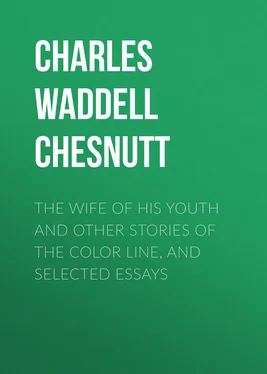Charles Waddell Chesnutt - The Wife of his Youth and Other Stories of the Color Line, and Selected Essays
Здесь есть возможность читать онлайн «Charles Waddell Chesnutt - The Wife of his Youth and Other Stories of the Color Line, and Selected Essays» — ознакомительный отрывок электронной книги совершенно бесплатно, а после прочтения отрывка купить полную версию. В некоторых случаях можно слушать аудио, скачать через торрент в формате fb2 и присутствует краткое содержание. Жанр: foreign_prose, foreign_antique, на английском языке. Описание произведения, (предисловие) а так же отзывы посетителей доступны на портале библиотеки ЛибКат.
- Название:The Wife of his Youth and Other Stories of the Color Line, and Selected Essays
- Автор:
- Жанр:
- Год:неизвестен
- ISBN:нет данных
- Рейтинг книги:5 / 5. Голосов: 1
-
Избранное:Добавить в избранное
- Отзывы:
-
Ваша оценка:
- 100
- 1
- 2
- 3
- 4
- 5
The Wife of his Youth and Other Stories of the Color Line, and Selected Essays: краткое содержание, описание и аннотация
Предлагаем к чтению аннотацию, описание, краткое содержание или предисловие (зависит от того, что написал сам автор книги «The Wife of his Youth and Other Stories of the Color Line, and Selected Essays»). Если вы не нашли необходимую информацию о книге — напишите в комментариях, мы постараемся отыскать её.
The Wife of his Youth and Other Stories of the Color Line, and Selected Essays — читать онлайн ознакомительный отрывок
Ниже представлен текст книги, разбитый по страницам. Система сохранения места последней прочитанной страницы, позволяет с удобством читать онлайн бесплатно книгу «The Wife of his Youth and Other Stories of the Color Line, and Selected Essays», без необходимости каждый раз заново искать на чём Вы остановились. Поставьте закладку, и сможете в любой момент перейти на страницу, на которой закончили чтение.
Интервал:
Закладка:
The sheriff recalled his own youth. He had inherited an honored name to keep untarnished; he had had a future to make; the picture of a fair young bride had beckoned him on to happiness. The poor wretch now stretched upon a pallet of straw between the brick walls of the jail had had none of these things,—no name, no father, no mother—in the true meaning of motherhood,—and until the past few years no possible future, and then one vague and shadowy in its outline, and dependent for form and substance upon the slow solution of a problem in which there were many unknown quantities.
From what he might have done to what he might yet do was an easy transition for the awakened conscience of the sheriff. It occurred to him, purely as a hypothesis, that he might permit his prisoner to escape; but his oath of office, his duty as sheriff, stood in the way of such a course, and the sheriff dismissed the idea from his mind. He could, however, investigate the circumstances of the murder, and move Heaven and earth to discover the real criminal, for he no longer doubted the prisoner's innocence; he could employ counsel for the accused, and perhaps influence public opinion in his favor. An acquittal once secured, some plan could be devised by which the sheriff might in some degree atone for his crime against this son of his—against society—against God.
When the sheriff had reached this conclusion he fell into an unquiet slumber, from which he awoke late the next morning.
He went over to the jail before breakfast and found the prisoner lying on his pallet, his face turned to the wall; he did not move when the sheriff rattled the door.
"Good-morning," said the latter, in a tone intended to waken the prisoner.
There was no response. The sheriff looked more keenly at the recumbent figure; there was an unnatural rigidity about its attitude.
He hastily unlocked the door and, entering the cell, bent over the prostrate form. There was no sound of breathing; he turned the body over—it was cold and stiff. The prisoner had torn the bandage from his wound and bled to death during the night. He had evidently been dead several hours.
A Matter of Principle
"What our country needs most in its treatment of the race problem," observed Mr. Cicero Clayton at one of the monthly meetings of the Blue Vein Society, of which he was a prominent member, "is a clearer conception of the brotherhood of man."
The same sentiment in much the same words had often fallen from Mr. Clayton's lips,—so often, in fact, that the younger members of the society sometimes spoke of him—among themselves of course—as "Brotherhood Clayton." The sobriquet derived its point from the application he made of the principle involved in this oft-repeated proposition.
The fundamental article of Mr. Clayton's social creed was that he himself was not a negro.
"I know," he would say, "that the white people lump us all together as negroes, and condemn us all to the same social ostracism. But I don't accept this classification, for my part, and I imagine that, as the chief party in interest, I have a right to my opinion. People who belong by half or more of their blood to the most virile and progressive race of modern times have as much right to call themselves white as others have to call them negroes."
Mr. Clayton spoke warmly, for he was well informed, and had thought much upon the subject; too much, indeed, for he had not been able to escape entirely the tendency of too much concentration upon one subject to make even the clearest minds morbid.
"Of course we can't enforce our claims, or protect ourselves from being robbed of our birthright; but we can at least have principles, and try to live up to them the best we can. If we are not accepted as white, we can at any rate make it clear that we object to being called black. Our protest cannot fail in time to impress itself upon the better class of white people; for the Anglo-Saxon race loves justice, and will eventually do it, where it does not conflict with their own interests."
Whether or not the fact that Mr. Clayton meant no sarcasm, and was conscious of no inconsistency in this eulogy, tended to establish the racial identity he claimed may safely be left to the discerning reader.
In living up to his creed Mr. Clayton declined to associate to any considerable extent with black people. This was sometimes a little inconvenient, and occasionally involved a sacrifice of some pleasure for himself and his family, because they would not attend entertainments where many black people were likely to be present. But they had a social refuge in a little society of people like themselves; they attended, too, a church, of which nearly all the members were white, and they were connected with a number of the religious and benevolent associations open to all good citizens, where they came into contact with the better class of white people, and were treated, in their capacity of members, with a courtesy and consideration scarcely different from that accorded to other citizens.
Mr. Clayton's racial theory was not only logical enough, but was in his own case backed up by substantial arguments. He had begun life with a small patrimony, and had invested his money in a restaurant, which by careful and judicious attention had grown from a cheap eating-house into the most popular and successful confectionery and catering establishment in Groveland. His business occupied a double store on Oakwood Avenue. He owned houses and lots, and stocks and bonds, had good credit at the banks, and lived in a style befitting his income and business standing. In person he was of olive complexion, with slightly curly hair. His features approached the Cuban or Latin-American type rather than the familiar broad characteristics of the mulatto, this suggestion of something foreign being heightened by a Vandyke beard and a carefully waxed and pointed mustache. When he walked to church on Sunday mornings with his daughter Alice, they were a couple of such striking appearance as surely to attract attention.
Miss Alice Clayton was queen of her social set. She was young, she was handsome. She was nearly white; she frankly confessed her sorrow that she was not entirely so. She was accomplished and amiable, dressed in good taste, and had for her father by all odds the richest colored man—the term is used with apologies to Mr. Clayton, explaining that it does not necessarily mean a negro—in Groveland. So pronounced was her superiority that really she had but one social rival worthy of the name,—Miss Lura Watkins, whose father kept a prosperous livery stable and lived in almost as good style as the Claytons. Miss Watkins, while good-looking enough, was not so young nor quite so white as Miss Clayton. She was popular, however, among their mutual acquaintances, and there was a good-natured race between the two as to which should make the first and best marriage.
Marriages among Miss Clayton's set were serious affairs. Of course marriage is always a serious matter, whether it be a success or a failure, and there are those who believe that any marriage is better than no marriage. But among Miss Clayton's friends and associates matrimony took on an added seriousness because of the very narrow limits within which it could take place. Miss Clayton and her friends, by reason of their assumed superiority to black people, or perhaps as much by reason of a somewhat morbid shrinking from the curiosity manifested toward married people of strongly contrasting colors, would not marry black men, and except in rare instances white men would not marry them. They were therefore restricted for a choice to the young men of their own complexion. But these, unfortunately for the girls, had a wider choice. In any State where the laws permit freedom of the marriage contract, a man, by virtue of his sex, can find a wife of whatever complexion he prefers; of course he must not always ask too much in other respects, for most women like to better their social position when they marry. To the number thus lost by "going on the other side," as the phrase went, add the worthless contingent whom no self-respecting woman would marry, and the choice was still further restricted; so that it had become fashionable, when the supply of eligible men ran short, for those of Miss Clayton's set who could afford it to go traveling, ostensibly for pleasure, but with the serious hope that they might meet their fate away from home.
Читать дальшеИнтервал:
Закладка:
Похожие книги на «The Wife of his Youth and Other Stories of the Color Line, and Selected Essays»
Представляем Вашему вниманию похожие книги на «The Wife of his Youth and Other Stories of the Color Line, and Selected Essays» списком для выбора. Мы отобрали схожую по названию и смыслу литературу в надежде предоставить читателям больше вариантов отыскать новые, интересные, ещё непрочитанные произведения.
Обсуждение, отзывы о книге «The Wife of his Youth and Other Stories of the Color Line, and Selected Essays» и просто собственные мнения читателей. Оставьте ваши комментарии, напишите, что Вы думаете о произведении, его смысле или главных героях. Укажите что конкретно понравилось, а что нет, и почему Вы так считаете.












